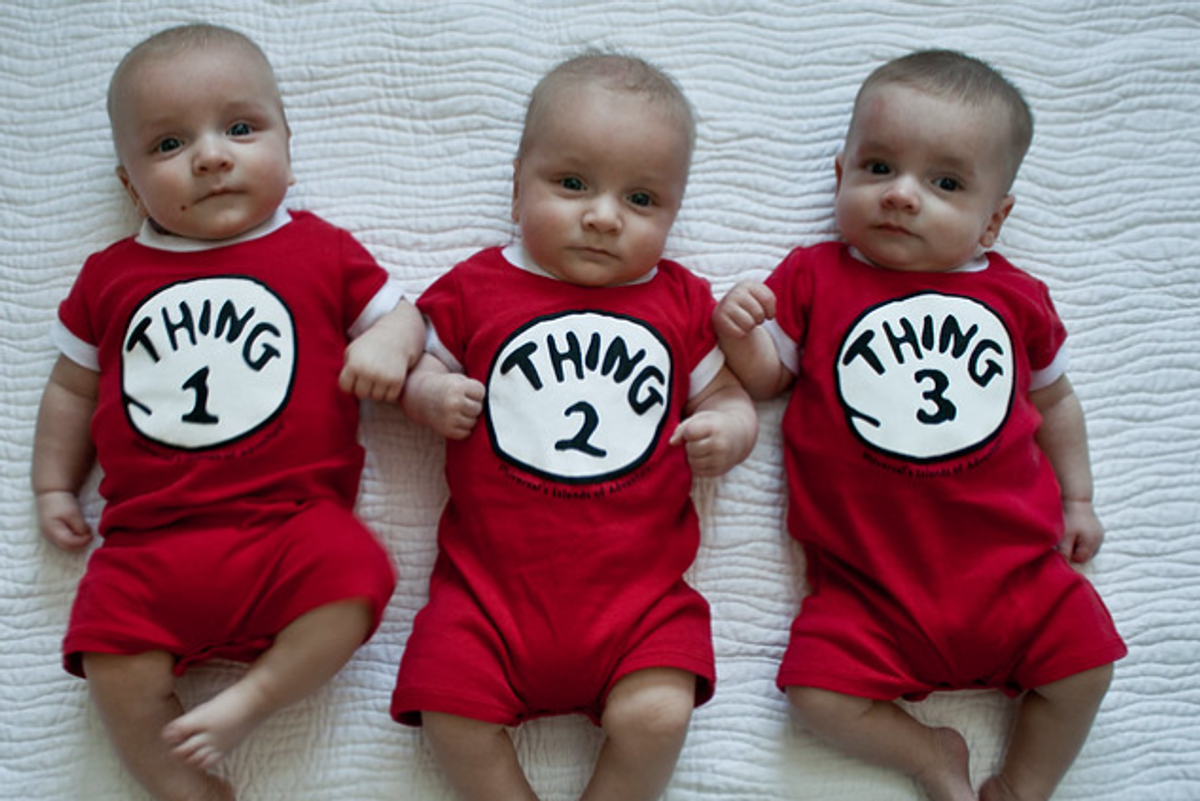Parents keep triplets' birth order a secret until a big reveal on their 18th birthday
Why did they wait so long?

Representative image. Triplet babies in "Thing" outfits.
Many people believe that someone’s personality can be determined by their birth order within a family. Older siblings are often seen as more responsible and the youngest is frequently characterized as the most laid-back. Although there isn’t much research to back up these claims, there is evidence that birth order can affect someone’s intelligence.
So, does birth order have any effect on multiples? In a unique case like triplets, there can be a small, self-fulfilling prophecy effect. Parents and siblings may project stereotypes onto one another, such as, “You were born first, now you’re first at everything,” or “You were born last, no wonder you’re lazy.”
Triplets on TikTok are going viral because they were never able to have any squabbles about their birth order because they never knew it until they turned 18. Janie Hilbert, 18, shared a video in February featuring her triplet brothers, Luke and Wright, that showed their reaction to learning their birth order for the first time.
The video is touching, but it didn’t reveal the actual order, just their reaction and it was still viewed over 20 million times.
x3 🤷😆
@janie.banie4 x3 🤷😆
After the post, TikTok was shouting for a follow-up video that revealed the results. A few days later, Janie posted a video that revealed their birth order, set to the theme song from “Full House.”
triplet birth order reveal!!!
@janie.banie4 triplet birth order reveal!!!
The post showed that Wright is the oldest, followed by middle child Luke and then Janie. Janie was not excited about being the youngest. “I did not want to be the youngest,” Janie told Today.com. “That’s the one thing I really hoped I hadn’t been waiting 18 years to be the youngest and then here we are.”
The triplets’ parents, Stewart Hilbert and Clay Hilbert, told Today.com why they decided to wait until their 18th birthday to learn the truth about their birth order. The decision was made because Clayton, their oldest child, was born three years before the triplets.
“He was also definitely precocious, a rule follower and very literal,” Stewart said, adding that he would probably tried to enforce an “olest gets the bottle first” mentality when the triplets arrived. “We just didn’t want to play his game, and we were like, alright, let’s just keep it a secret. It’ll be fun. They won’t have to subscribe to any of the stereotypes of oldest, middle, youngest, all that.”
It was tough keeping the birth order a secret for all those years, especially with the children constantly begging to find out the answer. “They definitely wanted to know, and that made it even more fun,” Stewart explained.
“We tried to figure it out for so long. We begged and begged. They wouldn’t crack,” Janie added.
The funny thing was that their father secretly revealed the truth in the family group chat which featured the children’s names in birth order. But the triplets never put it together. "I was so excited to try to tell them that it was in front of them the whole time," Clay said.
- People born between Gen X and millennials are humorously demanding recognition ›
- Grandma got a secret DNA test after noticing her granddaughter didn't look like her siblings ›
- Dr. Gabor Maté explains his 'no two children have the same parents' philosophy ›
- Birth order can have a significant effect on your life. - Upworthy ›



 Millennial mom struggles to organize her son's room.Image via Canva/fotostorm
Millennial mom struggles to organize her son's room.Image via Canva/fotostorm Boomer grandparents have a video call with grandkids.Image via Canva/Tima Miroshnichenko
Boomer grandparents have a video call with grandkids.Image via Canva/Tima Miroshnichenko


 A couple cooking in the kitchen with a cat sitting on the table beside chopped ingredients.
A couple cooking in the kitchen with a cat sitting on the table beside chopped ingredients.